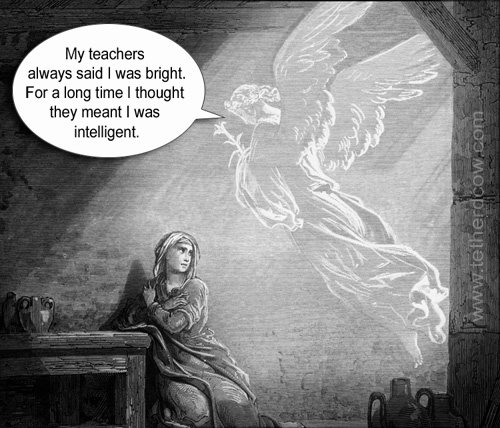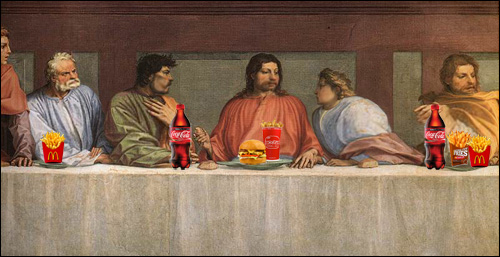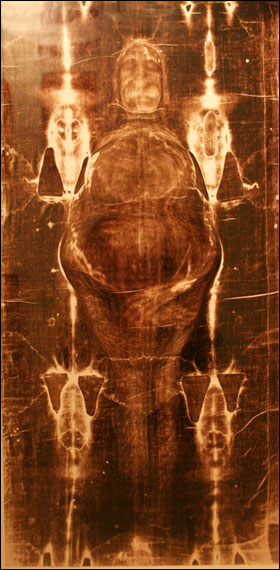
Sometimes the minds of really bright people can think really dumb thoughts.
Francisco J. Ayala is an evolutionary biologist of quite some expertise, a critic of creationism and intelligent design, and an active petitioner for the advancement of stem cell research in the US and throughout the world. And yet, as he reveals in his post on the Guardian blog this week, ‘Religion has nothing to do with science – and vice versa’ his accomplishments as a scientist don’t stop him from having bewildering thought processes.
The basic thrust of his piece is that science has no business occupying itself with the domain supposedly reserved for religion (and vice versa, but as we shall see in a bit, that’s nothing more than a sop to the unthinking). That is, science should butt out of matters of good and evil, right and wrong, purpose or none. It takes him about three paragraphs to reveal that he’s playing with a marked deck.
The scope of science is the world of nature: the reality that is observed, directly or indirectly, by our senses. Science advances explanations about the natural world, explanations that are accepted or rejected by observation and experiment.
Outside the world of nature, however, science has no authority, no statements to make, no business whatsoever taking one position or another. Science has nothing decisive to say about values, whether economic, aesthetic or moral; nothing to say about the meaning of life or its purpose.
Did you see the card go up his sleeve? He has simultaneously put religion outside our natural world and forbidden science from that domain. In other words, science can’t know the Mind of God, because.
It’s such a breathtaking piece of religious bias that I almost stopped reading right there.
What he’s advancing is in fact the very foundation of the concept of religion: give up (for reasons that cannot be expressed in any rational manner) everything you know and can demonstrate to be true, in preference to concepts that you (or other people, usually) suppose might be. That’s called ‘Faith’ and it goes by another name too: ‘Magic’. Ayala simply cannot make a claim like that and retain any level of credibility. If you allow that as a piece of valid reasoning, you allow ANYTHING to be possible. And I’m willing to wager a large amount of cash that Ayala doesn’t believe that huge numbers of Americans are being abducted by aliens, or that Xenu is going to come to Earth and smite us all, or that a little green man lives in the peyote plant or any number of other equally preposterous ideas. Yet, by his argument he has no choice but to believe them all because they are ALL outside his allowance for the realm of science!
The above quote also carries with it the implicit endorsement that religion does have something decisive to say about economic, aesthetic or moral values, and about the meaning of life and its purpose. That’s plainly hogwash. Which religion? Says what? For every one thing that a religion says, a contradiction can be found in another. Religions can’t even make up their minds internally about what they think about many things. Religions say stuff about all these things that’s for sure, but whether what they say is valuable, or ‘decisive’, or even worth paying attention to, is a highly questionable conjecture.
Further on he takes the words of Richard Dawkins and bends them to his already-decided will:
The biologist Richard Dawkins explicitly denies design, purpose and values.
In River out of Eden, he writes:
“The universe that we observe has precisely the properties we should expect if there is, at bottom, no design, no purpose, no evil and no good, nothing but blind, pitiless indifference.”
Dammit – did you see that? He palmed another ace!
Firstly, Dawkins is talking here about the mechanics of the Universe, as Ayala must surely understand. Dawkins does not say that we should expect to find no purpose or evil or good or blind pitiless indifference in humans. Dawkins is saying that there is no reason to suppose that those things are inherent in the Universe, and that this is in fact exactly what we see. ((Why isn’t Ayala arguing that point? Because as an evolutionary biologist, he knows he can’t win. ‘God’ – at least no kind of God that cares a hoot about us – is not apparent in the natural workings of the Universe.)) Ayala’s argument is based on a religious misrepresentation of scientific thinking, and, as a scientist, he should jolly-well know better.
Let’s see if Ayala is dealing anything else from the bottom of the deck. He goes on to conjure the spirit of William Provine, noted evolutionist and atheist:
William Provine, a historian of science, asserts that there are no absolute principles of any sort. He believes modern science directly implies that there are no inherent moral or ethical laws, no absolute guiding principles for human society.
There is a monumental contradiction in these assertions. If its commitment to naturalism does not allow science to derive values, meaning or purposes from scientific knowledge, it surely does not allow it, either, to deny their existence.
Zip! Now that’s a hand that’d get you shot in a saloon game of poker!
Let’s just clarify things a little. Ayala is making an explicit statement here that there are two kinds of worlds in which we live: the natural world (which is defined by science) and the supernatural ((I’m using the word in its most literal sense here: ‘of, pertaining to, or being above or beyond what is natural’)) world which is out of the reach of science. Because science can make observations about the natural world such that there appears to be no inherent meaning, morality or purpose, it has, therefore, no right to deny the existence of such things.
What total corn syrup! Science has every right in the world to put up a case for the non-existence of these things! Let me re-write that sentence slightly to make it clear why it’s so incongruous:
‘Because science can make observations about the natural world such that there appear to be no inherent reasons to believe in pixies or unicorns or fairies, it has, therefore, no right to deny the existence of such things.’
This idea of putting such abstract concepts as ‘meaning’, ‘purpose’ or ‘morality’ outside of nature is just religious sleight of hand. Who says that should be so, and by what criteria? Ayala begins by drawing up rules that suit his argument and then criticizes science for not playing by them!
It’s a bit of a straw man, in any case. He’s attempting to distract us from a much more pertinent point: the fact that science finds no ‘natural’ morality does not imply that a social morality is not possible (it clearly is) and most importantly, it certainly does not automatically stamp an imprimatur on religion to take that role. In fact, I would argue that a great deal of our current social morality is held in place not by religion, but by the social constructs we’ve developed under cultures that hold largely scientific world-views. We don’t, for example, find mobs of atheists going around behaving amorally (as much as I’m sure a lot of religious people think that is what happens), primarily because people like me who don’t hold with religion can actually maintain good moral lives without it, believe it or not.
Religious thinkers just love to believe that it is religion that holds our morality in check and stops the world from spinning into unmitigated and wanton chaos, but if they buy into that notion they must necessarily buy into a paradoxical uber-belief: it doesn’t matter what kind of religious belief you hold, as long as it’s a religious belief. ((Or, perhaps more accurately: ‘It doesn’t matter what kind of religious belief you hold, as long as it’s MY religious belief’.)) This is plainly a ridiculous and indefensible stance. For a start, there are plenty of religions that adhere to questionable morals. ((The majority of them, I would contest.))
I’ve attacked the versa part of Ayala’s essay first because I think by doing so it casts illumination on another piece of his prestidigitation. Let’s look at the ‘Religion has nothing to do with science’ part. Here, Ayala invokes Augustine, the emperor who rearranged Christian religion because it didn’t really suit his taste:
As he [Augustine] writes in his commentary on Genesis:
“If it happens that the authority of sacred Scripture is set in opposition to clear and certain reasoning, this must mean that the person who interprets Scripture does not understand it correctly.”
Is anyone else rolling on the floor laughing?
Again, let me clarify: If anything that makes sense appears to be in conflict with the Scripture, then that’s because the Scripture isn’t being properly interpreted. It can’t possibly be that the Scripture is nonsense! ((There are so many things wrong with this reasoning that I can’t begin to enumerate them all. The Bible, for example, makes explicit statements about the natural world. By Augustine’s reasoning, if any of these statements are thrown up against convincing scientific refutation, then there must be some interpretive error – it’s NOT an error of Scripture. What an astonishing ‘get-out-of-jail-free-card’ that is! In this way, the Bible can be eternally revised to fit with the way the natural world is shown indisputably to be and always remain correct! How can the rigorous process of science even begin to compete with such absurdity?))
It baffles me that a smart person can even indulge in such poppycock. From the start, it makes a ridiculous presupposition that the Scripture, like Ayala’s conditions for religion itself, lies outside nature – particularly outside human nature. How can a person with scientific training possibly believe that?
Ayala now throws a bone to the wolves in allowing that religion has nothing definitive ((Anyone else notice that card go to the bottom of the deck? ‘Definitive’ is a slippery term, especially in the light of Ayala’s other slipperiness. ‘Definitive’ allows that religion can have all kinds of things to say about the realm of science if it likes – just not ‘definitive’ things.)) to say about the ‘precincts of science’:
Religion has nothing definitive to say about these natural processes: nothing about the causes of tsunamis or earthquakes or why volcanic eruptions occur, or why there are droughts that ruin farmers’ crops. The explanation of these processes belongs to science. It is a categorical mistake to seek their explanation in religious beliefs or sacred texts.
It’s a banal dismissal of superstitious thinking of the gross kind. Of course we know that God can’t be blamed for earthquakes and eclipses and droughts and plagues of locusts. The only people who believe that kind of thing are the same ones who believe that God sits outside the realm of nature and can accomplish miracles!
Ow.
No matter how he might frame his argument, Ayala does not care about balance. He is concerned only with propaganda. Like all religious people he is scared that the truth is frightening and ugly and something he doesn’t want to hear, and that if science turns its sights on ‘matters of Scripture’ it might reveal, not that the Scripture is being interpreted incorrectly, but, as it has done time and time again, that the Scripture is wrong.
Ayala is only paying lip service to science, and to justify his already formed beliefs (Ayala is a former Dominican Priest) he seems compelled to attempt to somehow shoehorn science into the religious framework of a worldview that was formed half a millennium ago. His version of science is, for an evolutionary biologist, a puzzlingly simplistic mechanical one. It’s a science that doesn’t ask hard questions. It’s a science that obligingly looks the other way when religion walks into the room. It’s a convenient kind of science.
As we all know, though, science doesn’t care about convenience. Science doesn’t care how we think the world should be, or how we wish it was. It just shows us how it is. The way I see it is that we have two choices – we either side with science, look bravely on the Universe and be awed and humbled by our ignorance, or we cower behind our fingers with religion and make pretend everything will be OK. Either way, the world itself does not change.









